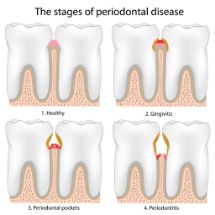
When it comes to advice for keeping your heart healthy, you mostly hear about exercise, good dietary choices, and stress management. But what about the link between gum disease and your heart? While it’s gotten more attention in recent years, many people aren’t aware that the two are connected. In this blog, you’ll learn about the signs of gum disease and how it can affect your cardiovascular health. You’ll also get some simple strategies from a dentist for how to keep your gums healthier!
Signs of Gum Disease To Watch For
Below are the most common symptoms of gum disease. Since treatment is most effective when it’s found early on, it’s important to schedule a checkup if you notice any of the following:
- Bleeding gums, particularly after brushing or flossing
- Tender or swollen gums
- Gum recession
- Chronic bad breath
- Loose teeth or feeling like your bite is off
The Connection Between Your Gums and Your Heart
One of the main contributing factors to gum disease is plaque, tartar and bacteria under the gumline. If these substances aren’t removed with daily brushing and flossing and professional cleanings, they cause inflammation and infection in the gums (i.e. gum disease). This condition destroys the gums and underlying bone that support the teeth and is the leading cause of tooth loss.
In addition, the bacteria under the gumline enter the bloodstream and travel throughout the entire body, including the heart. Once there, it leads to cardiovascular problems by increasing plaque formation and inflammation in the arteries. In fact, a recent study found that gum disease increases the risk of heart disease by around 20%.
How Can You Improve Your Gum Health?
Gum disease is quite common and affects an estimated 65 million Americans.
- Brush at least twice a day for two minutes and floss daily.
- Experiment with oral hygiene aids such as electric toothbrushes, oral irrigators, floss picks and more. For some people, these tools can make a big difference in helping them keep their teeth and gums clean.
- Quit smoking (tobacco is a risk factor for both gum disease and heart disease).
- See a dentist for regular checkups and cleanings. These visits not only find gum disease early but also prevent it by removing plaque and tartar that you can’t remove at home.
Now that you have an understanding of how your gums and heart are connected, you’ll be better equipped to maintain your smile and overall well-being at the same time.
About the Author
Dr. Amy Farrell is a family dentist with nearly a decade of experience and a graduate of the University of Maryland Dental School. To help her patients reduce their risk of both gum disease and heart disease, she always encourages regular checkups and good oral hygiene habits at home. If you want to know more about gum disease or have any other questions, she can be reached via her website.


